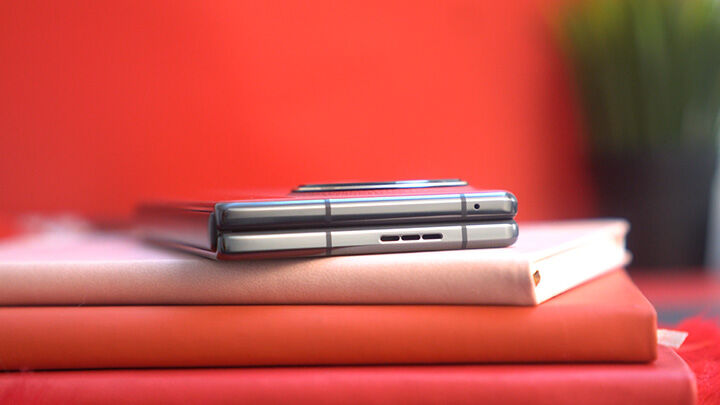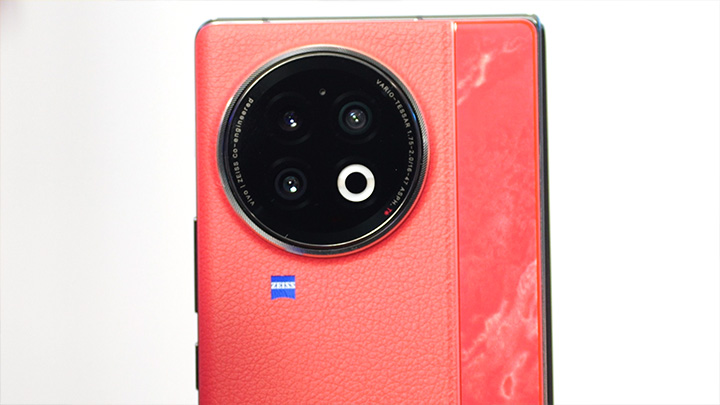The smartphone market is no stranger to innovation, but every now and then, a device comes along that truly pushes the boundaries of what a phone can be.
Enter the vivo X Fold 2.
–A foldable phone that aims to combine the portability of a smartphone with the utility of a tablet. But does it succeed in its endeavor?

Let’s find out.
Table of Contents

First things first, the vivo X Fold2 is a sight to behold.
The outer display, which you’ll use as a traditional smartphone’s resolution is crisp and vibrant.
It’s when you unfold the device that the magic of a foldable happens. The inner display is a massive 8.0-inch AMOLED screen that is almost square in shape, providing ample real estate for multitasking and media consumption.
The hinge mechanism feels sturdy, and the transition from the closed to the open position is smooth. Vivo has employed a multi-gear hinge design that ensures the device stays open at any angle. The phone feels premium in the hand with a combination of metal and glass. It’s a bit heavier than standard smartphones, but that’s a normal price to pay for the versatility foldables offer nowadays.

One area where vivo has made an impressive effort is in minimizing the crease in the middle of the screen. Although it is still visible if you look for it, in everyday use, it’s barely noticeable.
Move to the rear and our unit is in the “red” colorway, it’s mostly made up of this faux leather material to contrast the glossy panel on the right side.
Hard to miss, is the large circular camera module that houses its 50MP main sensor. We get some Zeiss branding to signify it’s Zeiss optics and features like its Zeiss T* lens coating.
For IO, folded, on the right side is a nifty alert slider, which can toggle the sound profile of the device to vibrate, followed by the volume rocker and power button.
At the bottom we have ½ stereo speakers, a noise-cancelling mic, USB Type-C port, and the dual nano SIM tray.

On top is the second half of the stereo speakers, and a noise-cancelling mic for speaker calls.

Embedded into the screen of the outer display is the first selfie camera, and unfolded we can find the latter mirroring the outer selfie camera’s placement.
For display, the vivo X Fold 2 features a 6.5-inch AMOLED outer display (1080 x 2520) and an 8.0-inch LTPO4 foldable AMOLED inner display (1916 x 2160). Both screens are as vibrant, sharp, and color accurate as each other and they both feature HDR10+ and Dolby Vison support for excellent contrast and color reproduction when watching HDR content.
Both displays also feature a 120Hz refresh rate for buttery smooth UI animations and games that can take advantage.
The inner display maxes out a brightness of 1800 nits, while the outer display maxes out at 1600 nits, making either of the displays viewable in virtually any lighting condition.

The stereo speakers are loud and clear. The resolution is great and yes, it’s I’ve got a Bluetooth speaker for a phone levels. It’s still not as loud as the ROG Phone 7 Ultimate but this could be because that devices’ speakers are pointed at you (So that’s something to think about).
Either way, whether you’re watching a movie or playing a game, the immersive experience is unparalleled. Plus the visual and auditory resolution and clarity you get out of the vivo X Fold 2 is just superb.
For biometric security, the vivo X Fold 2 features not 1 BUT 2 Ultrasonic In-display fingerprint scanners! The first of its kind in the foldable segment.

They’re very reliable and secure, and way quicker than the ones from 2019.
It also features face unlock but for the most part, I preferentially didn’t use it. It does work accurately given you’re in a well-lit enough environment when using.

For cameras, the vivo X Fold2 packs a versatile and powerful camera system. The rear camera setup features Zeiss optics and is headlined by a 50MP primary sensor [f/1.8], a 12MP telephoto sensor [f/2.0] (that serves as it’s 2x optical), a 12MP ultra-wide sensor [f/2.0].
The rear sensor is capable of shooting up to 8K @ 30fps, and 4K and FHD at 30/60fps.
It’s also worth mentioning that when shooting in 8K users will not have access to the ultrawide or stabilization features.
For selfies, both front-facing sensors are the same 16MP [f/2.5] sensor, perfect for social media use or video calls.
In general photos taken from the vivo X fold 2 are actually pretty vibrant and accurate-enough with good dynamic range. Photos come out very sharp, especially with the beaty features turned off, but color reproduction can lean more to the saturated side.
Portrait cutouts can be a little hit or miss, but all in all very good.
For the software side of things, the vivo X Fold2 runs on Origin OS 3 based on Android 13, and it’s optimized for the foldable display. You can run multiple apps side by side, and the large screen makes it great for productivity apps.

The device also supports an updated Multi-Instant View feature, which allows you to open the same app in multiple windows. This can be particularly useful for comparing documents or fact-checking.
Apart from all that it is a pretty bloated interface and you could find yourself spending an hour or so just getting rid of everything.
Under the hood, the vivo X Fold2 boasts the latest Qualcomm Snapdragon 8 Gen 2 (SM8550-A) 4nm processor that features an Adreno 740 GPU; coupled with 12GB of memory and available in either 256 or 512GB of internal storage.
And like most phones nowadays the vivo X Fold 2 can handle ANYTHING I throw at it. Productivity apps, multimedia apps, games, there’s nothing it can’t handle.

For those interested in benchmark scores here there are.
| Device: | Vivo X Fold 2 |
|---|---|
| Chipset: | Qualcomm Snapdragon 8 Gen 2 |
| RAM | 12GB |
| Antutu v9.6.0 | 1,531,812 |
| Geekbench Single-Core | 1,837 |
| Geekbench Multi-Core | 5,290 |
| Geekbench OpenCL | 8,717 |
| Geekbench Vulkan | 3,716 |
| PCMark Work 3.0 | 12,006 |
For battery, the X Fold 2 is powered by a 5,000mAh cell, ample for a day of mixed usage, even when unfolded.
In PC Mark’s Work 3.0 Battery Test, our unit garnered a result of 17 hours and 20 minutes folded, and 12 hours and 19 minutes unfolded.

It also features 120W fast charging support, which can charge up the device to full relatively quickly under 30 minutes. The X Fold 2 also features a very nifty 50W wireless charging and 10W reverse wireless charging.
And yes, the device features 5G, GSM, and everything in between in terms of network bands, in case you were wondering.
In conclusion, The vivo X Fold 2 is an exceptional device that successfully bridges the gap between smartphones and tablets. Its foldable design is not just a gimmick; it’s a genuinely useful feature that enhances productivity and entertainment.
However, it’s essential to consider the cost. The vivo X Fold 2 is a premium device, and its price reflects that. It’s not for everyone, but for those who are willing to invest in a cutting-edge piece of technology, it’s one of the best foldable phones out there.
In China it’s the 256GB variant is available for CNY 8,999PHP 72,540USD 1,236INR 104,774EUR 1,177, and CNY 9,999PHP 80,601USD 1,374INR 116,416EUR 1,308 for the 512GB configuration; which roughly converts to PHP 68,700USD 1,171INR 99,244EUR 1,115CNY 8,526 and PHP 76,000USD 1,295INR 109,790EUR 1,233CNY 9,432.
At the end of the day, the vivo X Fold2 is not without its flaws. The crease in the display is still visible, though it’s not a deal-breaker especially for early foldable adopters. The device is also quite heavy compared to standard smartphones, which might be an issue for some users as well.
The vivo X Fold2 represents what’s possible when innovation and technology come together. It might not be for everyone, but for those who choose it, it’s a window into the future of smartphones.

What we like about it:
What we did not like:
Vivo X Fold 2 specs:
Cover Display: 6.53-inch AMOLED, 1080 x 2520 pixels, 120Hz, HDR10+, Dolby Vision
Inner Display: 8.03-inch Foldable LTPO4 AMOLED, 1916 x 2160 pixels, 120Hz, HDR10+, Dolby Vision
Qualcomm SM8550-AB Snapdragon 8 Gen 2 (4 nm)
Adreno 740 GPU
12GB LPDDR5x RAM
256GB/512GB UFS 4.0 internal storage
Android 13, OriginOS 3 1
50 MP, f/1.8, (wide), Dual Pixel PDAF, Laser AF, OIS
12 MP, f/2.0, (telephoto), Dual Pixel PDAF, 2x optical zoom
12 MP, f/2.0, (ultrawide), Dual Pixel PDAF
8K@30fps, 4K@30/60fps, gyro-EIS
16 MP, f/2.5 front camera (cover display)
16 MP, f/2.5 front camera (inner display)
1080p@30fps
GSM / CDMA / HSPA / CDMA2000 / LTE / 5G
Wi-Fi a/b/g/n/ac/6e/7, Bluetooth 5.3, NFC
Dual screen fingerprint (under display, ultrasonic)
accelerometer, gyro, proximity, compass, barometer
4800 mAh battery, 120W wired, 50W wireless, 10W reverse wireless

YugaTech.com is the largest and longest-running technology site in the Philippines. Originally established in October 2002, the site was transformed into a full-fledged technology platform in 2005.
How to transfer, withdraw money from PayPal to GCash
Prices of Starlink satellite in the Philippines
Install Google GBox to Huawei smartphones
Pag-IBIG MP2 online application
How to check PhilHealth contributions online
How to find your SIM card serial number
Globe, PLDT, Converge, Sky: Unli fiber internet plans compared
10 biggest games in the Google Play Store
LTO periodic medical exam for 10-year licenses
Netflix codes to unlock hidden TV shows, movies
Apple, Asus, Cherry Mobile, Huawei, LG, Nokia, Oppo, Samsung, Sony, Vivo, Xiaomi, Lenovo, Infinix Mobile, Pocophone, Honor, iPhone, OnePlus, Tecno, Realme, HTC, Gionee, Kata, IQ00, Redmi, Razer, CloudFone, Motorola, Panasonic, TCL, Wiko
Best Android smartphones between PHP 20,000 - 25,000
Smartphones under PHP 10,000 in the Philippines
Smartphones under PHP 12K Philippines
Best smartphones for kids under PHP 7,000
Smartphones under PHP 15,000 in the Philippines
Best Android smartphones between PHP 15,000 - 20,000
Smartphones under PHP 20,000 in the Philippines
Most affordable 5G phones in the Philippines under PHP 20K
5G smartphones in the Philippines under PHP 16K
Smartphone pricelist Philippines 2024
Smartphone pricelist Philippines 2023
Smartphone pricelist Philippines 2022
Smartphone pricelist Philippines 2021
Smartphone pricelist Philippines 2020